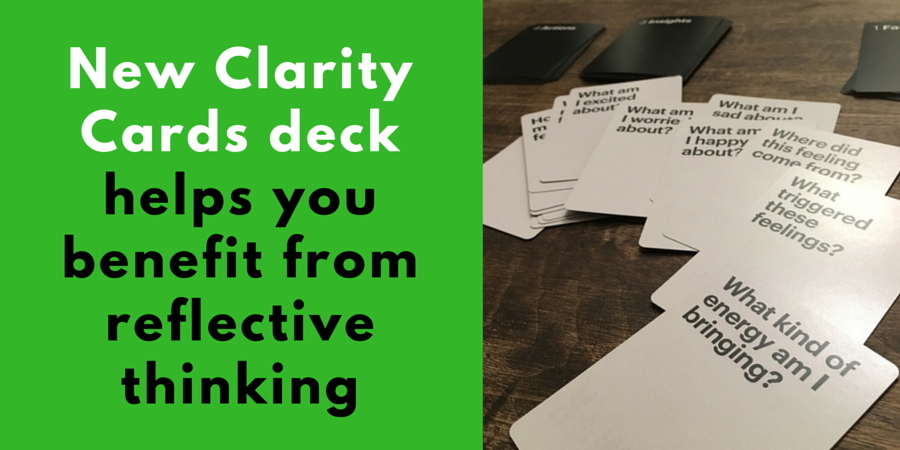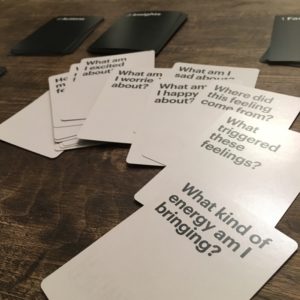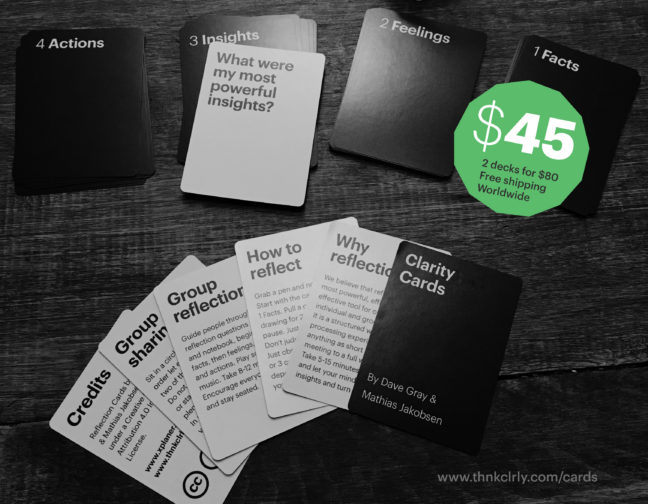 I recently discovered visual thinker Mathias Jakobsen’s excellent Think Clearly website, where he was talking about a fascinating new card deck he called Clarity Cards. He had created a prototype, and had launched a KickStarter campaign to gauge interest in them.
I recently discovered visual thinker Mathias Jakobsen’s excellent Think Clearly website, where he was talking about a fascinating new card deck he called Clarity Cards. He had created a prototype, and had launched a KickStarter campaign to gauge interest in them.
Immediately intrigued, I reached out to Mathias to express my interest in the Clarity Cards. Once he shipped the initial order of decks to his KickStarter benefactors, he sent me a deck and agreed to be interviewed about the thinking process behind it.
Chuck: What led you to create the Clarity Card deck?
 Mathias: I traveled to St. Louis to meet with my good friend Dave Gray. Dave is a fellow visual thinker and a huge inspiration for me, so it is always a huge treat to be received with open arms by him and his wife Michelle, and to come and stay in their house. There is something really special about just spending time together like that. The conversation flows. We discuss. Explore. Always with mutual curiosity and respect.
Mathias: I traveled to St. Louis to meet with my good friend Dave Gray. Dave is a fellow visual thinker and a huge inspiration for me, so it is always a huge treat to be received with open arms by him and his wife Michelle, and to come and stay in their house. There is something really special about just spending time together like that. The conversation flows. We discuss. Explore. Always with mutual curiosity and respect.
After dinner, we began flipping through each other’s notebooks. During this process, we each explore and often ask clarifying questions. What’s happening here? Why do you do it this way? It was during this mutual notebook-mind wandering that Dave said that he really liked all my self reflection. He wanted to do more of that. And so he began looking through my book to find the questions I ask myself. He found some sticky notes and a pen and together we began capturing and sorting the questions into four groups: facts, feelings, insights and actions.
“I bet we could make a really neat deck of cards with these questions,” said Dave when we were done. Then we talked about 100 other topics and almost forgot about it.
But when I got back to Brooklyn I couldn’t stop thinking about this. I began searching for a place that could produce a deck of cards and spent an evening designing them in InDesign. I ordered three decks as an initial test.
Two weeks later they arrived in my mailbox and I quickly put a photo on my Instagram and Twitter. I was so surprised by the positive response. People were immediately asking where they could order a copy.
Chuck: Who can benefit from the Clarity Card deck the most?
Mathias: There are several answers to these questions. Let me share a few of them.
The target audience is pretty simple: the cards were made and put on Kickstarter and targeted to people who already trust me as a creator, typically because they subscribe to my newsletter or read my annual reports, and who would be likely to buy pretty much any product with a “made by Mathias” label on it.
Why only these people? Because it was the easiest people to reach and they didn’t require much convincing or slick (and expensive) marketing material. If you look at my Kickstarter page it is not optimized for conversion. It does not have a cool video. I did not waste any time or money or effort making it “perfect” because I wanted to know if people would buy it without all that. Turns out they did: the project was fully funded in 19 hours and before the campaign ended it had raised more than 500% of the initial goal.
I don’t know exactly who it’s for and who can benefit the most. That’s actually one of the reasons I had to make them. How would I be able to find out without first putting them in the hands of actual people?
This is just the first version and I’ve put out about ~500 decks at this point so it’s a pretty tiny project – but I am now getting messages from all kinds of people all over the world writing about how they are using the cards to deepen their most intimate relationship, to process the hardship of cancer treatment at a young age and to make their development teams more efficient.
In a way, it’s not really a product yet. It’s just self-funded user studies and marketing research. All of this will help me evolve the product and marketing and make it better and better.
Chuck: What problems is it designed to address or solve?
Mathias: The cards are designed to solve a pretty simple problem: when you sit yourself down to reflect and process your own experiences it can be hard to know where to begin. The cards offer simple writing prompts to get you going. And if you get stuck the prompts can help you reframe and refocus and move forward. Also I think the cards help by giving people confidence to begin the practice. They make it feel more legitimate.
Chuck: How can it help people be more creative?
Mathias: Reflections helps me connect the dots between my experiences, emotional reactions, and thoughts and learnings, and it pushes me to make tangible specific actions to bring these learnings into my life. This might not give me new inspiration but it certainly increases my chances of acting on the inspiration. On taking actual steps to do something with it. It also helps me get unstuck when the creative process hits a dead end.
Chuck: What was David Gray’s role in the development of the card deck?
Mathias: He saw the idea as he was reading through my notebook. He helped me lift the questions out of it and encouraged me to pursue it and bring it to the world. He also put his own name behind it as a sign of trust and was a huge help in promoting the Kickstarter campaign far and wide. I couldn’t have done it without his support.
Chuck: How did you develop the content for it ?
Mathias: The content was already there. It was just sitting in my notebooks through my own reflections from the past many years. Some were explicit. Others we had to infer from whatever I had written and ask “what question would prompt someone to think in this way?”
Chuck: Why is reflection so important? Why hasn’t there been a structured way of doing it before?
Mathias: There has been a structured way but not too many people are probably aware of it. It’s not taught in our schools. But it is hugely important to reflect because it reinforces our natural cycle of learning. Think of a kid (I have two toddlers) they run around and make mistakes again and again. They hurt themselves. They get disciplined. They get rewarded with natural intrinsic delight of new discoveries and the joy of acquiring a new skill. Which is in some way what we are all doing as adults too. But we are just so busy doing the next thing that we rarely take the time to actually integrate all the input we get and turn it into learning and turning the learning into new behavior. Reflection helps us do that. In a gentle way.
Chuck: Is the need for clarity in our work and personal lives greater than it was before? If so, why?
Mathias: It’s hard to say for sure since none of us knows exactly what it was like to live in the mid 1850s and nobody from back then are alive today. However there seems to be a broad and general agreement around the rate of change which is perceived to be accelerating. Everything is moving faster. We are more connected. To more people. Further away. We produce ever more data. Rockets are landing backwards. Cars drive themselves (almost). And even people in their early 20s can feel like they are falling behind the technological evolution and becoming irrelevant. Is this really real or just perception? Perhaps it doesn’t matter: the need for calm and clarity certainly doesn’t seem to be diminishing.
Chuck: How does the Clarity Card deck enhance the reflection process?
Mathias: This is also a question that I am trying to answer by putting them out in the world. I know how they help me: I use them whenever I get stuck in my own reflections. And I have been very positively surprised at how effective they really are. I was quite dismissive of them initially, thinking that they were mainly for “other people” who don’t have an ingrained reflection practice like I do. But they have really helped me get out of some challenges.
Chuck: How does the card deck fit in with the workshops are doing around the world right now?
Mathias: Self reflection is a integral part of how I live my life and what I am helping others do in my Think Clearly blog. So with or without the cards, reflection is integral to the workshops.
Chuck: Why is it so hard for the average person to process experiences? How does this card deck help?
Mathias, First, there is no such thing as an average person. I find such language offensive. We are all unique individuals. We may have certain challenges in common and have similar experiences but we need to watch our language since it shapes how we see the world. I also don’t think it is hard for most people to process their experiences. I haven’t met someone who found reflection to be difficult. But I do meet a lot of people (and myself included) who struggle to make it a priority in a busy day to day life.
Will the card deck help? Maybe. Maybe not. I think a physical artifact can serve as a reminder and be something that makes it legitimate. It can feel more like valuable work because it has a name and a process and not just be frivolous journaling in a notebook. That’s my hope.

